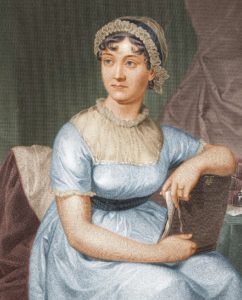 The most important among the narrative modes of Jane Austen is her use of irony. Irony may be defined as a mode of discourse for conveying meaning different from and usually opposite to the apparent meaning of a text. Whether an irony is situational or verbal, depends on the devices available to and utilized by the author. Situational ironies, or dramatic ironies occur when the audience (or reader) knows the character’s real situation before the character knows it. Pride and Prejudice begins with a sentence that reads like a maxim: —“It is a truth universally acknowledged, that a single man in possession of a good fortune, must be in want of a wife”– With these words, the irony of the whole situation is expressed brilliantly.
The most important among the narrative modes of Jane Austen is her use of irony. Irony may be defined as a mode of discourse for conveying meaning different from and usually opposite to the apparent meaning of a text. Whether an irony is situational or verbal, depends on the devices available to and utilized by the author. Situational ironies, or dramatic ironies occur when the audience (or reader) knows the character’s real situation before the character knows it. Pride and Prejudice begins with a sentence that reads like a maxim: —“It is a truth universally acknowledged, that a single man in possession of a good fortune, must be in want of a wife”– With these words, the irony of the whole situation is expressed brilliantly.
The first few sentences carry out several functions simultaneously. It is a comment made by the author, both incisive and assured, as if it really is a universal truth. Then, as the readers proceed to the next paragraph, the scope of this “universal truth” gets narrower. It is not universal any more but something that Mrs Bennet would like to believe.
The first chapter clearly indicates that the theme or central concern of the novel is marriage. However, the ironic tone of the narrative warns us that it will not be a conventional one. As the readers go through the conversations between Mrs and Mr Bennet, they gradually realize that their marriage is not a blissful one. There is an unbridgeable gap between their minds. The narrative begins with this portrayal of a failed marriage which eventually casts a long shadow over other characters and relationships. Austen uses such situational irony in conjunction with the shifting point of view giving an added dimension to her narrative in Pride and Prejudice.
The central irony of Elizabeth’s initial opinion of Darcy, and Darcy’s initial opinion of Elizabeth and their subsequent reversal provides the foundation of “Pride and Prejudice”. Since we, the readers, follow the narrative primarily from Elizabeth’s point of view, we are as misled as she is. Therefore, we make the same mistake in judgement and only realize it when her judgement is ironically reversed in her realization: “… till this moment I never knew myself” (Ch. 36).
Verbal ironies give Pride and Prejudice much of its sparkle and attraction. The principal user of such ironies among the characters is Mr. Bennet. His speeches, especially to his wife, are all ironical since she is quite incapable of understanding his intentions. Elizabeth also uses irony in the beginning of her conversation with Darcy: “… I have always seen a great similarity in the turn of our mind”, and later, in her conversation with Wickham: “…at such a distance as that you know things are strangely misrepresented” (Ch.52)
Many of the indirect comments of the narrator are also ironical. The reader is as deluded by them as the fictional characters are by the setting on which indirect comment is made. After Darcy’s departure from Netherfield, we have the comment, “…to his other recommendations was now added that of general unreserve.”
Sometimes we are bewildered by the shift from one point of view to a completely different point of view. The narrator reports Elizabeth’s change of feeling towards Darcy: “She began now to comprehend that one was exactly the man who in disposition and talents would most suit her.” In the very next paragraph, there is a shift with an ironic overtone: “ …but no such happy marriage could now teach the admiring multitude what felicity really was.”
At the deepest level, the ironic discourse specially in narrator’s comments juxtaposes the accepted contemporary social norms and expectations. Jane Austen’s ironies in Pride and Prejudice thus constantly build up challenges to the meaning of the text . This is why they leave the modern readers with a space in which, instead of taking as given, they can make up their own minds about the meanings that Austen wanted to convey and their own responses to it.
Character Study of Elizabeth Bennet



The following quotation appears in chapter 52 not in chapter 32 -“…at such a distance as that you know things are strangely misrepresented”.
Thank you so much